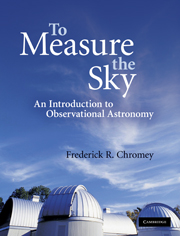2 - Uncertainty
Published online by Cambridge University Press: 05 June 2012
Summary
Errare humanum est.
– Anonymous Latin sayingUpon foundations of evidence, astronomers erect splendid narratives about the lives of stars, the anatomy of galaxies or the evolution of the Universe. Inaccurate or imprecise evidence weakens the foundation and imperils the astronomical story it supports. Wrong ideas and theories are vital to science, which normally works by proving many, many ideas to be incorrect until only one remains. Wrong data, on the other hand, are deadly.
As an astronomer you need to know how far to trust the data you have, or how much observing you need to do to achieve a particular level of trust. This chapter describes the formal distinction between accuracy and precision in measurement, and methods for estimating both. It then introduces the concepts of a population, a sample of a population, and the statistical descriptions of each. Any characteristic of a population (e.g. the masses of stars) can be described by a probability distribution (e.g. low-mass stars are more probable than high-mass stars) so we next will consider a few probability distributions important in astronomical measurements. Finally, armed with new statistical expertise, we revisit the question of estimating uncertainty, both in the case of an individual measurement, as well as the case in which multiple measurements combine to produce a single result.
- Type
- Chapter
- Information
- To Measure the SkyAn Introduction to Observational Astronomy, pp. 35 - 59Publisher: Cambridge University PressPrint publication year: 2010

